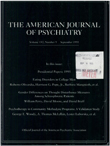Effects of clozapine on positive and negative symptoms in outpatients with schizophrenia
Abstract
OBJECTIVE: Clozapine is an atypical neuroleptic with superior efficacy in severely ill, treatment-resistant inpatients with schizophrenia. To determine if clozapine's differential efficacy generalizes to less ill, outpatients populations, the authors examined the effects of clozapine on positive and negative symptoms in outpatients with schizophrenia. METHOD: Outpatients with schizophrenia who had histories of partial response to conventional neuroleptics and who had not responded to a prospective 6-week trial of fluphenazine participated in a 10-week, double-blind, parallel-groups comparison of clozapine and haloperidol. Thirteen men and six women were given clozapine, and 15 men and five women were given haloperidol. Clinical response rates were determined and effects on primary versus secondary negative symptoms were addressed. Doses of clozapine and haloperidol at the end of the 10-week trial were 410.5 mg/day (SD = 45.8) and 24.8 mg/day (SD = 5.5), respectively. RESULTS: Clozapine was superior to haloperidol for treating positive symptoms. In addition, eight of the patients given clozapine and only one of the patients given haloperidol fulfilled clinical responder criteria. Clozapine was also superior to haloperidol for treating negative symptoms, although these effects were relatively minor. Negative symptoms were significantly affected in the subgroup of patients with nondeficit schizophrenia but not in the subgroup with deficit schizophrenia. Overall, clozapine was well tolerated. CONCLUSIONS: Clozapine has superior efficacy for treating positive symptoms in partially responsive outpatients with chronic schizophrenia, suggesting that it has utility for a broad spectrum of patients with schizophrenia beyond the most severely ill.
Access content
To read the fulltext, please use one of the options below to sign in or purchase access.- Personal login
- Institutional Login
- Sign in via OpenAthens
- Register for access
-
Please login/register if you wish to pair your device and check access availability.
Not a subscriber?
PsychiatryOnline subscription options offer access to the DSM-5 library, books, journals, CME, and patient resources. This all-in-one virtual library provides psychiatrists and mental health professionals with key resources for diagnosis, treatment, research, and professional development.
Need more help? PsychiatryOnline Customer Service may be reached by emailing [email protected] or by calling 800-368-5777 (in the U.S.) or 703-907-7322 (outside the U.S.).



